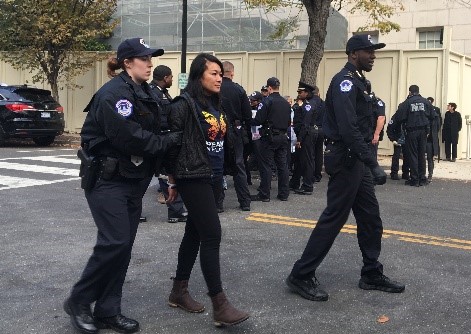
For Asian Pacific American Heritage Month, the AFL-CIO is spotlighting various Asian Americans and Pacific Americans who have worked and continue to work at the intersection of civil and labor rights. Our next profile is Monica Thammarath.
Monica Thammarath was born and raised in San Diego, the daughter of refugees from Laos. She is a proud product of California's public education system and she earned two bachelor's degrees, one in political science and the other in social welfare. She is currently pursuing a master's in public administration at American University.
While in college, Thammarath began organizing to provide services that help students gain access to affordable and high-quality education. After graduation, she began working as the education policy advocate for the Southeast Asia Resource Action Center. She has since taken the position of senior liaison in the Office of Minority Community Organizing and Partnerships at the National Education Association, where she works on social justice issues like immigration, voting and collective bargaining rights.
She serves on the national executive board of the Asian Pacific American Labor Alliance (APALA), the national governing board of the National Asian Pacific American Women's Forum and the National Council of Asian Pacific Americans, where she serves as co-chair of the education committee. In 2017, she was elected as the youngest person to ever hold the office of national president of APALA. Upon taking the office, she said:
APALA has always held a special place in my heart. I am honored to have been elected as the new National President, and I am excited to strengthen our chapters, our community and labor partnerships, and elevate the voices of Asian American and Pacific Islander (AAPI) workers and workers of color everywhere.
In an interview with LeanIn.org, she explained the importance of her work:
I realized that no matter how many girls I worked with, some of them would never have the opportunities to succeed unless the policies at the federal level reflected their needs. And those policies would never change unless people like me—people who personally understood the needs of those most impacted—were at the table to make their needs known.
And she spoke about the surprising road from college to her professional career:
If you asked me what I thought I’d be doing after college, moving from California to Washington, D.C., to work on federal education policy wouldn’t have been my answer. If you told me that four years later, I’d still be in D.C. working to connect the labor movement to civil rights and community organizations, I would have said you were crazy.
Thammarath's time as president of APALA has been eventful and the organization has been active. Since she took office, APALA has focused on building power for Asian and Pacific Americans, as well as defending workers' rights, fighting for justice for immigrants, temporary protected status and Deferred Action for Childhood Arrivals holders, countering rising hate and white supremacy, fighting for women and reproductive rights, defending diversity, joining the efforts to stop Brett Kavanaugh from being confirmed to the Supreme Court, defending public education and advocating for sustainable jobs in a changing climate, among other efforts.

